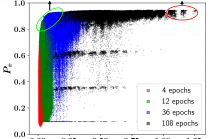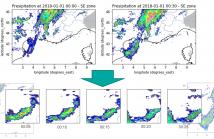
- Read more about EC-NAS: Energy Consumption Aware Tabular Benchmarks for Neural Architecture Search
- Log in to post comments
Energy consumption from the selection, training, and deployment of deep learning models has seen a significant uptick recently. This work aims to facilitate the design of energy-efficient deep learning models that require less computational resources and prioritize environmental sustainability by focusing on the energy consumption. Neural architecture search (NAS) benefits from tabular benchmarks, which evaluate NAS strategies cost-effectively through precomputed performance statistics. We advocate for including energy efficiency as an additional performance criterion in NAS.
- Categories:
 22 Views
22 Views
When providing the boundary conditions for hydrological flood models and estimating the associated risk, interpolating precipitation at very high temporal resolutions (e.g. 5 minutes) is essential not to miss the cause of flooding in local regions. In this paper, we study optical flow-based interpolation of globally available weather radar images from satellites.
- Categories:
 55 Views
55 Views